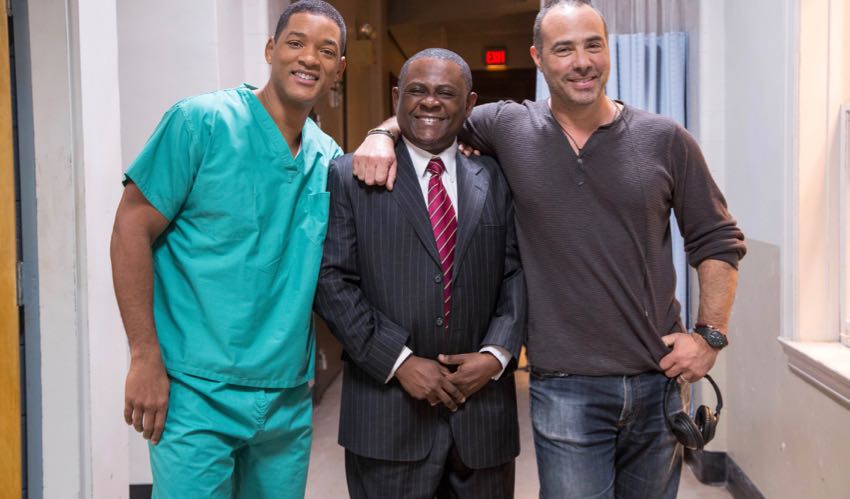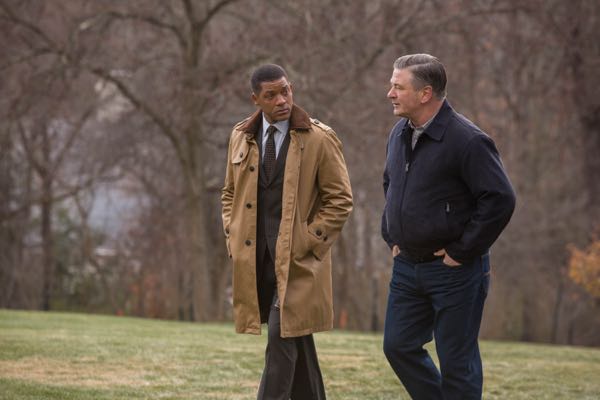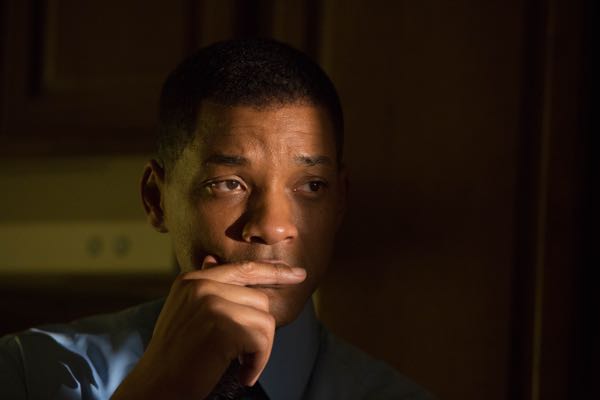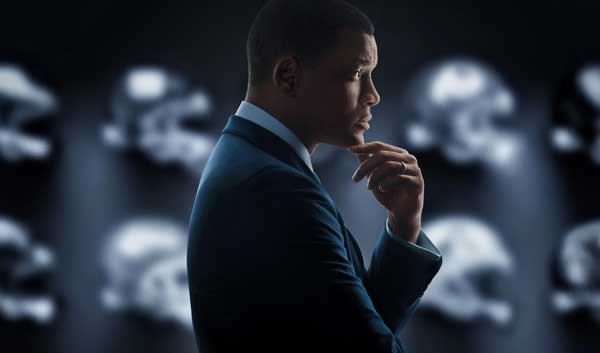Will Smith, Dr. Bennet Omalu and 'Concussion' Director Talk Movie and NFL Players Reactions
- Details
- Category: Interviews
- Created: Wednesday, 30 December 2015 14:51
- Published: Thursday, 31 December 2015 10:57
- Written by Justine Browning

One of the most impactful films of the year, CONCUSSION is both thought-provoking and difficult to watch. Starring Will Smith, the drama tells the true story of a forensic pathologist Dr. Bennet Omalu who exposes the deadly consequences of football-related head trauma.
During an autopsy of former NFL player Mike Webster (David Morse), Omalu discovers a neurological deterioration on par with Alzheimer’s disease. When he learns that other players have befallen the same fate, he fights to share his findings with the world. Watch Trailer
Will Smith stars as Omalu in the film, which is directed by Peter Landesman (Kill the Messenger). Smith, Omalu and the filmmakers were on hand at a recent NY press conference to discuss working on the project.
Q: How did this project get started?
Giannia Scott: I received the GQ article written by Jeanne Marie Laskas. I felt like it was a story that had to be told and I thought it was important to get the awareness out there – this new disease. So I told my husband, Ridley Scott, and he thought it was also a very important subject to make a film. So we shopped it around a bit, but everyone was scared to touch it. Then we brought it Peter (Landsman ) who wrote a brilliant treatment. We went to Sony and they bought it on the spot. So we were super excited and then my husband called up Will (Smith) and said, “I got a present for you.” Will went “What?” (Will interjected, That ain’t no damn present). My husband said, “You got to do this.” And we got Will. Will is the best person we couldn’t have gotten. I don’t know if you guys know this by Will and Bennet are so similar in their hearts – they’re generous, loving and selfless and that’s what this story is about. It’s about a man so selfless that he gave everything up to get this message out and that’s what this money is about.
Will Smith: So alright, I’ll see you guys later (laughing, making believe he’s getting up and leaving.)
Q: How does your performance differ when you’re playing a fictional character and the man right next to you? And what did you take away from each other? Did you ask questions? And Dr. Omalu, how do you think Will did?
Will Smith: So I played Muhammad Ali in “Ali,” I played Chris Gardner in “The Pursuit of Happiness,” and now Dr. Omalu and for me it really plays into my strong suits when I can actually play to the person. It’s much more terrifying with the end product, because you know that one day you’re going to end up in the movie theater with
the person while they watch you butcher their life. It’s terrifying in that sense, but in terms of preparation. To be able to sit, talk and feel, I met his family, his friends, and we talked for hours. I rode in his car and listened to the music he listened to, his daughter called, all of the different aspects. I watched him completely dismantle human bodies. I think watching Bennet doing an autopsy was the most powerful insight. There was music playing. It’s like he’s delivering souls from this world to the next, and just how seriously he takes that job, not just on a physical level, but on a spiritual level. It’s a spiritual responsibility to deliver these souls to the other side. I got hooked into the almost paradoxical nature of spirituality and science it deeply opened the well spring to the inner truth of Bennet.

Q: I think the big question is how did Will do?
Dr. Bennet Omalu: Sony invited me to see the movie, when it was done, in a small theater about the size of this room. As the movie began, that first scene I saw Will Smith play me. About 10 minutes later, I don’t know what happened to me, it turned from association to transformation, I became totally lost into the moment. I was embedded in the Omalu I saw on the scene. That is a testament to the job he did. It reminded me of my childhood perception of America as the land of perfection. And his acting in that moment epitomized perfection. So I was in the movie myself, I no longer saw Will Smith. I was seeing Bennet Omalu on the screen. The contortions of his face, the emotional composition of his acting, where he slammed his hand on the table that was me. My wife said, “OMG, Maybe I should now be answering to Mrs. Smith.
He did such a good job that it makes me proud to be part of the American family. You don’t know what is it until you’re an immigrant, who hungers to be part of the American story. This is what it is to be American.
When I met Will Smith I was terrified and star struck. He came with Peter (Landesman) and saw an autopsy and then it was time for lunch. I figured they drive behind me, then Peter came and said, “Do you mind if Will drives with you?” “Excuse me!” He said, “Will wants to ride in your car with you.” I thought, ‘Oh my gosh, what humility.” Such
a big star riding in my car, in front with me. I said, “okay. I was very nervous, and I looked at my car, it wasn’t too dirty.” He got in. What an exceptional person he was. What could be as natural as me in my own car driving on the freeway. He was asking me questions, very personal questions, and there I was answering them perfectly. When we got to the restaurant we stayed in the car almost 30 minutes. So he stole my heart away from me to be honest.
Until I met Will and Peter I never realized how producing a movie was technically inclined, that there was so much science, so much money behind producing a movie. That was what it taught me and moving forward Will is a good person, he has a good time. I spent time with him. I was teaching him how to use a microscope and at the end he said to me, “Whatever happens don’t stop what you’re doing. This is who you are. Do let any movie, or anyone steal this away from you. This is who you are, what you’re best at.”
The second thing he taught me – be true to who you are. And in all things remain humble, nothing is more American than that. So this is the story of one American family. We are one love, one spirit, we are held together by the bond of peace. That is what this movie, this experience is about. And I’m glad it’s being released on Christmas day. So moving forward let us continue to be the joyful people we are because we lead the world.

Q: Peter, a lot of your films seem to be about challenging the corporate media and the establishment. Why have you gravitated towards that mission?
Peter Landesman: The various whistle blower stories I’ve written have all been a dress rehearsal up to now. The man to my left (Bennet) who and what he is. He is the perfect embodiment of this dynamic – a man that is missionized by one simple thing – the truth. Consequences be what they may, it’s not his concern. He’s interested in discovering. He’s interested in telling the truth, and he’s not interested in what happens next. That’s our problem. I love the simplicity and spiritual purity of the narrative, whether it’s going up against the New York Times, whether it’s going up against the FBI or the president of the United States. It’s always the same.
Q: Bennet’s faith inspired his pursuit to tell the truth. What inspired you?
Will: My grandmother was really my connection to God, my spiritual teacher and she was “that” grandma at the church. She was the one having the kid’s doing the Easter repetitions and putting on the Christmas plays. Kids and grandkids had to be first and so she was the most spiritually certain person I ever met in my life. Even to the point that when she was dying she was happy, like she was really excited about going to heaven. And so I had a deep emotional composition about spirituality and I connected those things also with Bennet. With Bennet, the scientific part was the new edition. My grandmother wasn’t a woman of science, you know, she was a woman of the spirituality and the Bible, to connect that part of it was the new edition, interesting but a little more difficult to reconcile for me. But the spirituality was easily comprehended.
Q: Has any of the family seen the movie?
David Morse : My wife and daughter have seen it, and my daughter is 8 years old. Let me tell you a story. Her name is Ashley. So we got home, she said to me, “Daddy, did it really happen that you talked to me when I was in mommy’s tummy?’ ‘Yes, honey it really happened.’ Did I talk to God, did I really help you? “Everything worked out fine, so you must have spoken to God.’ ‘Yes’ ( he motioned his arm like a sign of victory. So that was her reaction. So when you look at this movie, it’s not about football, because football is part of the American experience. I walked out of that movie feeling proud I was finally an American. The movie simply summarizes what it means to be an American. As Peter said, it’s only in America that you could have a Will Smith. And it is only in America that you could have a Bennet Omalu. It’s a fact.
If I hadn’t come to this country I wouldn’t have had this opportunity, I wouldn’t have this education to contribute my part, just like everyone else. Together the impossible become the possible. That’s what this movie is about. America is the land of dreams, because what you dream can become possible. See the movie on Christmas day and then come let’s talk.
Ridley Scott and Giannia have established the Bennet Omalu Foundation. I said ‘Don’t name it after me” but, again Ridley and Giannia began with a dream – we want to find a cure for CTE (chronic traumatic encephalopathy). As impossible as that sounds it only begins with a dream. There’s a commonality – religion supports science. If you don’t believe it go see this movie.

Q: Have you screened it for anyone at the NFL?
Peter Landesman: I have a background as a journalist and my instinct is to reach out and get everybody and then decide who is telling the truth and the NFL didn’t really have a part to tell in this story. This story is already told every Sunday and the Super Bowl so there’s really been no communication with them. I hope they go see the movie and enjoy it. They should embrace it because this is a movie that isn’t trying to hurt them.
As Bennet said we all have to be together and find a solution. I’ve got many, many calls from players. I was actually surprised how many players felt the need to see the movie. Remember Chris Borland, the 49ers linebacker, who was rookie of the year felt the need to retire. He was rookie of the year and 23 years old, he was about to become one of the greatest players in the league and he opted to retired because he felt the rest of his life was more important than being a football player. We showed him early the movie on the Sony lot. It was just him and he was shaking and crying. Chris had commented, “If I was ever going to make a movie it would be this one.” He was literally dissembling as he was watching this film, because he felt like he was watching what he has just avoided. Last week there was a screening in Atlanta for 70 current and former ball players. I was there but I understand it was a very emotional room, big strong men brought to tears. Some of them having very powerful emotions.